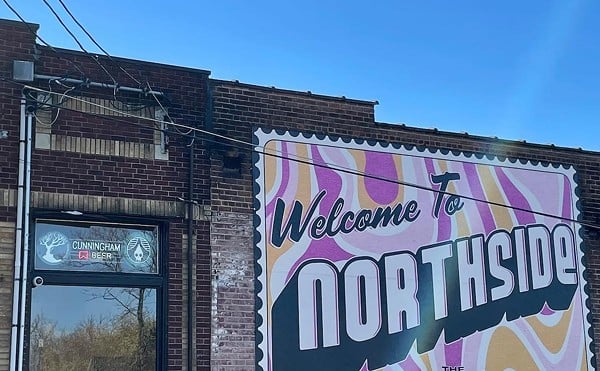Two guitarists in a band is fairly standard, and even two drummers has been done successfully. But two bassists? Now there’s something you don’t often see, unless you follow the exploits of Cletus Romp.
“We walk over each other’s lines and I usually go up the neck,” says Tim Golliher, the Cincinnati quintet’s electric bassist who works in tandem with upright bassist Mark Karapondo. “I can do leads and Mark can do more root stuff. He’ll flip the stick over and use the bow close to the bridge.”
“And it’s kind of an old clunky upright so when he digs into it with the bow, it sounds like a chainsaw,” says frontman Derek Stinson over beers at the Northside Tavern, alleged to be the band’s second home. “It’s just this ‘braaawwr!’”
Stinson’s metaphor approximating Karapondo’s bass sound might not be a half bad description of Cletus Romp as a whole.
The Roots Rock outfit sputters and roars like an ancient rope-start chainsaw; no chain guard, spitting oil smoke and gas fumes and flinging out jagged chips as it mows through its cordwood influences. The raw proof is all over Cletus Romp’s debut release, the raucous six-song The Broke Tooth EP, from the Hillbilly Rock stomp of “Goliath’s House” to the menacing Country Blues prowl of “No Angels” to the twang twisted Gospel Punk of the irresistible “Jet Ski With Jesus.” Sounding like a darkly gleeful triangulation of John Doe, Drive-By Truckers and The Georgia Satellites, Cletus Romp is roadhouse hoedown mayhem at its very best.
The roots of Cletus Romp go back several years through various incarnations, most of which played more typically structured Country. Stinson had already decided that he wanted to get slightly more aggressive and rootsier in his sonic approach; the addition of Golliher and drummer Adam Brokamp two years ago began the process. The membership of Karapondo and lead guitarist Mike Templeton last year cemented it.
“I went into it wanting to be rough and raw, to let it all loose, and everybody seemed to fall right into it and excel,” says Stinson. “That’s what I wanted and everybody delivered.”
Other than Stinson’s Country band lineage, little in Cletus Romp’s collective résumé would indicate their current garage twang direction: Golliher played in a cover band and did improv sketch comedy; Brokamp drummed for artsy projects and fire dancers in Arizona; Templeton played in college bands, leaving music behind for graduate school until Stinson recruited him; and Karapondo has played (and continues to play) in a broad range of other bands.
In fact, when the subject of common influences comes up, music doesn’t crop up for a while.
“Fear and panic,” Golliher says.
“Physical violence,” adds Stinson.
“I think Derek’s scowl is the driving force,” Brokamp says.
“You notice all three went, ‘Yeah...’ ” Stinson says. “I haven’t scowled in a long time.”
“You scowled at me just last week,” notes Templeton.
“That’s on a personal level,” Stinson answers. “I just don’t like you.”
Interestingly enough, when broaching the subject of what inspires the band musically, band references come in last.
“For me, it’s just a desire to make a really good groove and have fun,” Golliher says. “To find this neat spot where everybody likes it.”
“For me, Derek’s songs are really original. I love the songs,” Templeton says. “What I listened to growing up doesn’t matter. What matters is that I hear these songs and they’re really incredible and I want to take what I hear and make it sound really cool.”
Even as the primary songwriter, Stinson talks less about direct musical influences and more about environmental ones.
“Being down here and eavesdropping,” he says, indicating the bar surroundings. “You hear a piece of a conversation that someone’s having and the gears start clicking and off you go. It’s all fantasy. None of the charges have stuck.”
Part of the band’s mythology, if you will, is Stinson’s songwriting from the perspective of a character named Cletus Romp, who can shift from tender lover to murderous redneck in the space of a verse (“He came to take everything that’s mine/That’s fine, if he likes the taste of a shovel” goes a line in “Secret”).
“He stays with the focus of the Cletus character and the songs are written in a similar stride, which makes it easy to keep up,” Brokamp says. “Generally somebody’s going to die in the song, violently.”
“Not every song,” corrects Stinson. “Sometimes they’re already dead.”
“It just struck me,” Templeton says. “The last thing you would ever want is to turn up in a Cletus Romp song.”
Eventually, Stinson does own up to some musical guideposts and it’s not hard to hear strains of it all in the The Broke Tooth EP.
“I listen to a lot of Tom Waits,” Stinson says. “Local hero, Chuck Cleaver. Hands down, the best writer in this city as far as I’m concerned. And Hogscraper was freaking great. Influence is wherever I can get it.”
Engineered by the incomparable John Curley at Ultrasuede, The Broke Tooth EP is a visceral Roots/Garage Rock heart-punch intended to showcase the powerful new direction of Cletus Romp.
“And that’s really where the name came from,” Stinson says. “I wanted it to come out like a kick in the teeth … bam! I’m really happy with the way it came out, in that regard.”
CLETUS ROMP celebrates its new release Aug. 12 at the Northside Tavern with The Mysts of Time. Buy tickets, check out performance times and find nearby bars and restaurants here.





